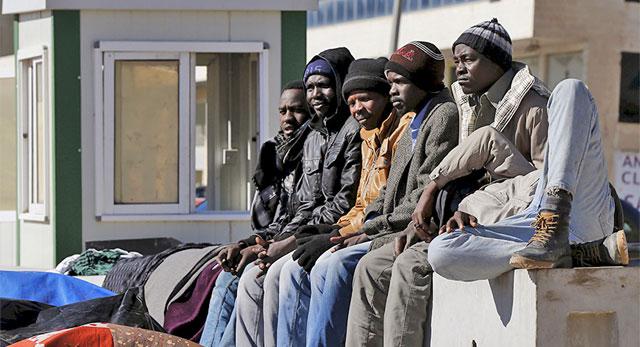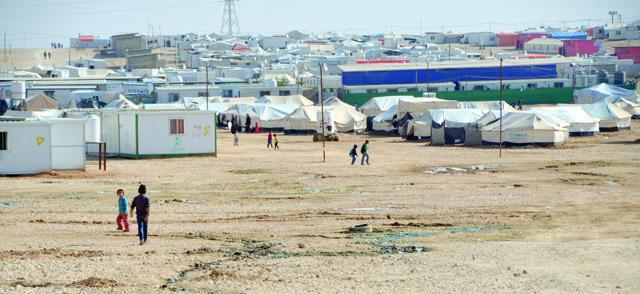You are here
Yemeni refugees continue to face legal hurdles in Jordan
By Ana V. Ibáñez Prieto - Sep 10,2018 - Last updated at Sep 10,2018
AMMAN — Yemeni refugees in Jordan continue to face legal challenges related to their residence and ability to work while in the Kingdom, according to a report issued by the legal aid organisation Arab Renaissance for Democracy and Development (ARDD) on Sunday.
The paper, titled “Recent Development and Main Challenges of Yemeni Refugees Situation in Jordan”, follows up on a prior study conducted by ARDD on decisions made by the Jordanian government in relation to Yemeni nationals.
The study also presented the top legal challenges faced by Yemeni nationals in Jordan based on ARDD’s experience providing legal services to refugees who used the organisation, which amounted to a total of 157 since the beginning of 2018.
“Yemeni nationals face issues like those experienced by any other group of refugees in Jordan, but the financial aspect becomes the most significant one among all the challenges they face,” the report said. “Most legal issues experienced by Yemeni refugees arise from their financial inability and the lack of aid — especially in light of the recent reduction in assistance to refugees of all nationalities.”
The most common legal issues pointed out by the organisation in the report included Yemenis’ failure to pay their rent due to lack of financial support and their inability to find employment and obtain a work permit, which would escalate into lawsuits with landlords and later eviction.
“In addition to those challenges, Yemeni refugees also suffer from the lack of access to healthcare and education services,” the report continued.
“Financial issues affect refugees of all nationalities across the region, but Yemenis become more vulnerable due to the regulations and laws in place for their entry and departure from Jordan,” programme manager at ARDD, Souzan Mohareb, told The Jordan Times during an interview. She said Yemenis experienced constraints and were unable to travel due to their inability to pay the accumulation of overstay fines.
In December 2015, the Jordanian government announced its decision to regulate the entry of Yemenis to the country and implement laws regarding their residency, restricting the entry of Yemenis to the Kingdom unless a visa is obtained before arrival.
“More flexibility is needed in terms of access to visas in order to help refugees to either leave or return to Jordan when required to fix their legal status in the country,” Mohareb said.
“The problem is multiplied by the lack of international aid available for Yemeni refugees,” she continued. “All organisations are now focused on Syrian refugees, while other minorities are being neglected and no basic services are provided.”
“We do not deny the existence of numerous local and international organisations that provide in-cash and in-kind aid, healthcare, protection and other services to the Yemeni refugees and those of other nationalities,” the ARDD report said. “However, such aid is insufficient, and we need the international community to come together and provide the support needed to fulfil the basic needs of refugees of all nationalities.”
Commenting on the remarks, external relations officer at UNHCR, Jordan Francesco Bert, said that “UNHCR is always advocating for an all-encompassing refugee approach aimed at providing all refugees with the same opportunities regardless of their nationality”.
“However, UNHCR allocates its programmes according to the funds we receive, and when a donation is marked to go toward the Syrian refugee response, that is the only thing we can do with it,” Bert told The Jordan Times over the phone. “The issue is a lack of sufficient funding rather than a lack of willingness.”
“The reasons why the Syrian refugee crisis is receiving so much attention are evident, but this comes with the consequence that refugees of other nationalities are being treated as second-class refugees,” the official lamented. “This is one of the areas in which UNHCR is struggling the most, advocating for an all-inclusive refugee approach towards authorities and our donors.”
The Yemeni refugee population is the third largest group of refugees in Jordan after Syrians and Iraqis, with a total of 12,194 registered Yemeni refugees, according to UNHCR data of August 2018.
Related Articles
AMMAN — Due to the large influx of Syrian refugees, Iraqis and persons of concerns (POCs) from Sudan, Yemen and Somalia and other countries
AMMAN — The Arab Renaissance for Democracy and Development (ARDD) on Thursday issued a report on Jordan's legal response to the Syrian refug
AMMAN — Local organisations have welcomed the Ministry of Interior’s (MoI) announcement of a brand new campaign aimed at regularising the st















